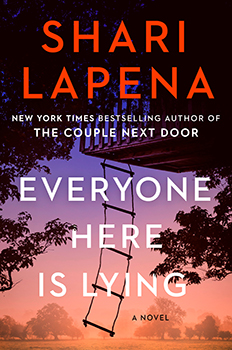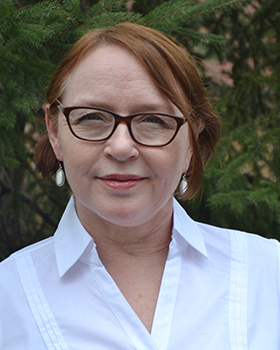

Features Shari Lapena
How do YOU Spell Unnerving?
 By K.L. Romo
By K.L. Romo
If only, if only, if only.
In bestselling author Shari Lapena’s newest thriller, EVERYONE HERE IS LYING, Erin Wooler repeats these words to herself as a mantra. Her nine-year-old daughter, Avery, disappeared on her way home from school, and she fears the worst: that someone kidnapped her while she walked home. But Erin soon finds the truth is way worse.
When the police come to investigate, Erin’s doctor husband, William, acts sketchy, like he’s hiding something. He told the police he wasn’t home that afternoon and hadn’t seen Avery. Why did it sound like a lie? And why had he been away from work?
Erin admits Avery has behavioral issues, but sees her daughter through a mother’s loving lens. Erin doesn’t believe Avery is a bad seed, but others begin to understand something is chilling about the nine-year-old.
As the police expand their investigation into the whole neighborhood, it’s obvious that many things in the upscale subdivision are not what they seem. But who’s telling the truth, and who’s lying?
A series of unusual incidents cause a chain reaction that explodes, tearing their community apart. And the secrets Avery holds are more shocking than all the other lies put together.
Here, The Big Thrill catches up with Lapena to discuss the creative process, writing from a hot point of view, and infiltrating the mind of a sociopath.
How has being a former English teacher and lawyer informed your writing?
Not much, to be honest. If I had done criminal law, it might have had more of an impact. And I wasn’t a lawyer for very long. On the other hand, they teach lawyers to anticipate everything that might go wrong, and I’m pretty good at that. But that might just be my own nature. As far as being an English teacher goes, it was more the case of my love of literature, of reading and writing, that made me become an English teacher, rather than my being an English teacher informing my own writing. I think I just always wanted to be a writer, from a young age, and spent a large part of my life on detours until I finally did what I was meant to do all along.
How do you go about writing a thriller that readers don’t want to put down? What is your secret weapon?
I don’t want to give away all my secrets! But I’ll tell you a few. You must have a great story that includes not just one story question the reader must answer, but many smaller questions, too. Readers are curious, and they will continue reading to find out what they want to know. I raise a lot of interesting questions in my books. Characters don’t have to be likable, but the reader must be involved in their emotional lives, and I do that by writing from multiple points of view. I write from a rather ‘hot’ point of view, rather than a detached one, so the reader is carried along on the emotion of the characters. Also, short chapters!
EVERYONE HERE IS LYING includes a portrait of a sociopath. What was your strategy for making that character believable and chilling?
I think I just always wanted to be a writer, from a young age, and spent a large part of my life on detours until I finally did what I was meant to do all along.I do a lot of reading about psychology and psychopaths. And then, I create a character and get inside that character’s head. It just seems to happen; I don’t seem to have any problem imagining what it might be like inside the head of a psychopath. Perhaps I should be worried.
Have you ever known a sociopath in real life?
Yes. I’m pretty sure.
Tell us more about your farm. Does farming play into your creative process?
My husband and I bought an old, derelict farm outside of Toronto about eight years ago. It was one of those ‘escape to the country’ projects. It took almost seven years to redo it—it had to be gutted and completely rebuilt, and it’s still not quite done—but we absolutely love living there. We don’t farm it ourselves, but we rent out some of the land to a local farmer. There’s a barn nearby where I can ride horses, which I enjoy. My husband has various green projects like solar panels, an electric tractor, and a vegetable garden.
Which one of your books is your favorite and why?
I honestly don’t have a favourite in terms of the actual book, but in terms of what the book did for me, it would have to be The Couple Next Door, which changed my life. It allowed me to focus on writing thrillers full-time, and I feel very fortunate.
What advice can you give aspiring thriller writers?
Everyone always says to read a lot. That’s a given, so I’m going to say that you should write what you want, write what interests you and excites you, and try to find your own voice. Writing in secret is good for that. I don’t believe in showing your work too early because early criticism can shut you down.
Tell us something about yourself your fans don’t already know.
Hmmm…in real life, I’m a conflict avoider. I also used to avoid conflict in my fiction. But my first editor, back when I was writing comedies, before I wrote thrillers, pointed out that I avoided conflict in my writing. I wasn’t even aware of that. And she told me to seek out conflict, to intensify it as much as I can—so that’s now what I do! I’ve gotten quite good at it. But I still avoid conflict in real life.
- The Big Thrill Recommends: ONE BIG HAPPY FAMILY by Jamie Day - September 16, 2024
- The Big Thrill Recommends: ONLY ONE SURVIVES (Video) by Hannah Mary McKinnon - July 30, 2024
- The Big Thrill Recommends: WHAT YOU LEAVE BEHIND by Wanda M. Morris - June 27, 2024

